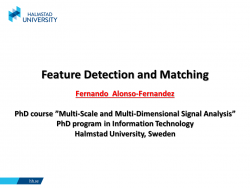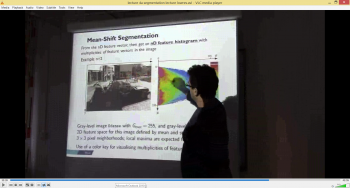Difference between revisions of "Feature Extraction And Matching"
From ISLAB/CAISR
(Created page with "{{Infobox |image = 200px |header1 = Feature Extraction and Matching |header2 = '''Contact:''' Fernando Alonso-Fernandez }} Welc...") |
|||
| (4 intermediate revisions by one user not shown) | |||
| Line 1: | Line 1: | ||
{{Infobox | {{Infobox | ||
| − | |image = [[Image: | + | |image = [[Image:Features picture.png|200px]] |
|header1 = Feature Extraction and Matching | |header1 = Feature Extraction and Matching | ||
|header2 = '''Contact:''' [[Fernando Alonso-Fernandez]] | |header2 = '''Contact:''' [[Fernando Alonso-Fernandez]] | ||
| Line 6: | Line 6: | ||
| − | Welcome to this lecture on '''Feature Extraction and Matching Techniques'''. | + | Welcome to this lecture on '''Feature Extraction and Matching Techniques''' |
| + | |||
| + | (page created in November 2015, last modification November 2016) | ||
| + | |||
| + | In this lecture we will give an overview of algorithms for feature extraction and matching. The purpose of features is to extract particular properties (features) of images, intended to be non redundant and informative enough to enable subsequent learning tasks. The list learning tasks is huge, including (to cite just a few) person or object recognition, motion tracking, pose estimation, robot navigation, 3D reconstruction, etc. | ||
== Teaching Material == | == Teaching Material == | ||
| − | Get '''slides''' from Google docs (ppt) [https://drive.google.com/file/d/ | + | Get '''slides''' from Google docs (ppt) [https://drive.google.com/open?id=0BzuKeaCE7_FyMHc4ck5QNXI0UDQ here] |
| + | |||
| + | |||
| + | [[Image:features_and_matching.png|250px]] | ||
| + | |||
| + | |||
| + | '''See the lecture''' in Youtube: (available soon) | ||
| + | |||
| + | |||
| + | [[Image:video-lecture-segmentation.png|350px]] | ||
| + | |||
| + | |||
| + | |||
| + | == References and sources == | ||
| + | |||
| + | {| class="wikitable" | ||
| + | |- | ||
| + | |'''R. Klette, “Concise Computer Vision”, Springer, 2014''' | ||
| + | * Sections 9.1, (feature invariance), 9.2 (SIFT and others, testing invariance) | ||
| + | * Section 9.3 (tracking and updating of features), not seen here | ||
| + | * Get [https://drive.google.com/file/d/0B95UheoCtOzoQnh6NmNSd2R0eDg/view?usp=sharing chapter 9] | ||
| + | * Site of the author (full book not available, but plenty of other resources): http://ccv.wordpress.fos.auckland.ac.nz/ | ||
| + | |} | ||
| + | |||
| + | {| class="wikitable" | ||
| + | |- | ||
| + | |'''R. Szeliski, “Computer Vision: Algorithms and Applications”, Springer 2010''' | ||
| + | * Section 4.1 (features) | ||
| + | * Full book available online: http://szeliski.org/Book/ | ||
| + | |} | ||
Latest revision as of 14:47, 25 November 2016

| |
| Feature Extraction and Matching | |
|---|---|
| Contact: Fernando Alonso-Fernandez |
Welcome to this lecture on Feature Extraction and Matching Techniques
(page created in November 2015, last modification November 2016)
In this lecture we will give an overview of algorithms for feature extraction and matching. The purpose of features is to extract particular properties (features) of images, intended to be non redundant and informative enough to enable subsequent learning tasks. The list learning tasks is huge, including (to cite just a few) person or object recognition, motion tracking, pose estimation, robot navigation, 3D reconstruction, etc.
Teaching Material
Get slides from Google docs (ppt) here
See the lecture in Youtube: (available soon)
References and sources
R. Klette, “Concise Computer Vision”, Springer, 2014
|
R. Szeliski, “Computer Vision: Algorithms and Applications”, Springer 2010
|

